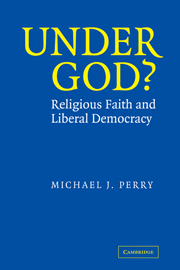Introduction: The Controversy over Religion in Politics
Published online by Cambridge University Press: 05 June 2012
Summary
As politically alert Americans are well aware, the proper role of religious faith in the public life of the nation is one of the most controversial issues in the United States today. The controversy erupted anew when, on August 27, 2000, Senator Joseph Lieberman of Connecticut – at the time, the Democratic candidate for vice president of the United States – addressed the congregation of the Fellowship Chapel, one of Detroit's largest African-American churches. In his speech, Senator Lieberman called for a larger role for religious faith in American politics. “As a people,” said Lieberman, “we need to reaffirm our faith and renew the dedication of our nation and ourselves to God and God's purpose.” The next day, on the front page, under the headline “Lieberman Seeks Greater Role for Religion in Public Life,” the New York Times reported that Lieberman “bluntly made the case for allowing faith into politics.” The Times then quoted some key passages from Senator Lieberman's speech:
“I want to talk to you this morning about another barrier that may fall … as a result of my nomination,” he said. “I hope it will enable people, all people who are moved, to feel more free to talk about their faith and about their religion. And I hope that it will reinforce the belief that I feel as strongly as anything else, that there must be a place for faith in America's public life.” He added that “we know that the Constitution wisely separates church from state, but remember: the Constitution guarantees freedom of religion, not freedom from religion. […]
- Type
- Chapter
- Information
- Under God?Religious Faith and Liberal Democracy, pp. vii - xviPublisher: Cambridge University PressPrint publication year: 2003



